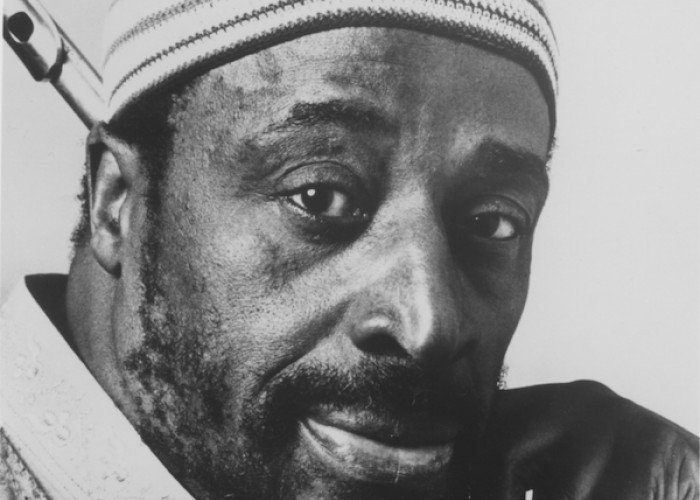Jan 13, 2026 2:09 PM
More Trump-Kennedy Center Cancellations
The fallout from the renaming of the John F. Kennedy Center for the Performing Arts to include President Donald…

Yusef Lateef (1920–2013)
(Photo: DownBeat Archives)Yusef Lateef, the Detroit-bred multi-instrumentalist and composer who was born in 1920 and lived to be 93, was a musician of Walt Whitman-esque multitudes. Lateef (whose birth name was William Emanuel Huddleston) traveled down so many different creative paths during the last 30 years of his life—many far afield from mainstream jazz—that the bewildering variety can blunt an understanding of the specifics.
Lateef’s late work, documented on dozens of albums, most on his own YAL label, deserves wider circulation—both for the intrinsic merits of his best music and as a marker of his inexhaustible life force. Lateef’s productivity sped up as he aged. He was a progressive from the get-go, but his music turned more experimental, even radical, as he approached and then marched through his octogenarian years. Lateef called himself an “evolutionist.”
“It was in Yusef’s nature to experiment,” said percussionist Adam Rudolph, Lateef’s closest collaborator during the last 25 years of his life. “He put no limits on himself. He believed that anything you can imagine as an artist, you can do, if you develop the craft for it.”
Lateef’s autumnal period began at age 61 when he started a four-year research residency at Ahmadu Bello University in Zaria, Nigeria, in 1981. Recorded in 1983, In Nigeria (Landmark) finds Lateef’s wailing tenor saxophone and wooden flutes channeling the wisdom of the ancestors and the essence of the blues, alongside animated African percussionists and vocalists. The music winks at Lateef’s early assimilation of African, Middle Eastern and Far East influences in the 1950s, but eschews song forms and other jazz tropes—except for the ever-present cry of the blues that remained part of his heartbeat for life.
In the late 1980s, Lateef explored meditative music. On Yusef Lateef’s Little Symphony (Atlantic), which won a Grammy Award in the New Age category, Lateef plays saxophones, flutes, percussion, synthesizer and keyboards; he improvises freely over trance-inducing textures and static harmony. The chamber pieces on 1989’s Nocturnes (Atlantic) convey an enticing, Satie-like tranquility.
At the opposite extreme, Lateef made four raucous, two-tenor albums in 1992–’94 on YAL with a traditional rhythm section and a guest tenor saxophonist on each: Archie Shepp, Von Freeman, Rene McLean and Ricky Ford. They pack the wallop of a stiff drink—Lateef’s nightcap to jazz conventions, save an occasional 12-bar blues.
Lateef increasingly favored diverse ensembles, earthy rhythms, spontaneous forms, abstraction and extensions of the world-music experiments he started in the ’50s and the African music he studied in the ’80s. He built melodies from speech rhythms and employed an intervallic composing system. Sometimes, he and Rudolph would split an ensemble in two, each composing for half without knowing what the other was writing. These ideas bear fruit on the exceptional concert album The World At Peace (Music For 12 Musicians) (YAL/Meta). Recorded in 1995, the project was co-led by Lateef and Rudolph, and featured an improvising ensemble of reeds, brass, strings and percussion. Some pieces are loose and improvisatory, some are through-composed. Towards The Unknown (YAL/Meta) from 2010 features Rudolph’s soulful Concerto For Brother Yusef, with Lateef’s stentorian tenor sound streaked with blues moans amid strings and percussion.
Lateef also composed prolifically in a classical vein, including four symphonies and three string quartets, though much of this formal concert music remains unpublished and unrecorded. The 14-minute String Quartet No. 3, premiered posthumously in 2015 by the Momenta Quartet, unfolds in four movements that evoke the expressionism of Berg and Bartók; but Lateef’s fanciful melodic and rhythmic gestures are his own. This piece deserves a place in the repertoire, as do several twilight-of-tonality solo piano miniatures on the 1991 album Yusef Lateef’s Encounters (Atlantic).
On The African-American Epic Suite For Quintet And Orchestra (ACT) from 1994, a 45-minute tone poem merges orchestra, Lateef and Eternal Wind, a quartet rooted in world-music fusions. The conceptual breadth makes a statement. As Lateef told this writer in 2001: “My music represents everything I’ve studied and applied in my own way.” DB

Belá Fleck during an interview with Fredrika Whitfield on CNN.
Jan 13, 2026 2:09 PM
The fallout from the renaming of the John F. Kennedy Center for the Performing Arts to include President Donald…

Peplowski first came to prominence in legacy swing bands, including the final iteration of the Benny Goodman Orchestra, before beginning a solo career in the late 1980s.
Feb 3, 2026 12:10 AM
Ken Peplowski, a clarinetist and tenor saxophonist who straddled the worlds of traditional and modern jazz, died Feb. 2…

The success of Oregon’s first album, 1971’s Music Of Another Present Era, allowed Towner to establish a solo career.
Jan 19, 2026 5:02 PM
Ralph Towner, a guitarist and composer who blended multiple genres, including jazz — and throughout them all remained…

Rico’s Anti-Microbial Instrument Swab
Jan 19, 2026 2:48 PM
With this year’s NAMM Show right around the corner, we can look forward to plenty of new and innovative instruments…

Richie Beirach was particularly renowned for his approach to chromatic harmony, which he used to improvise reharmonizations of originals and standards.
Jan 27, 2026 11:19 AM
Richie Beirach, a pianist and composer who channeled a knowledge of modern classical music into his jazz practice,…